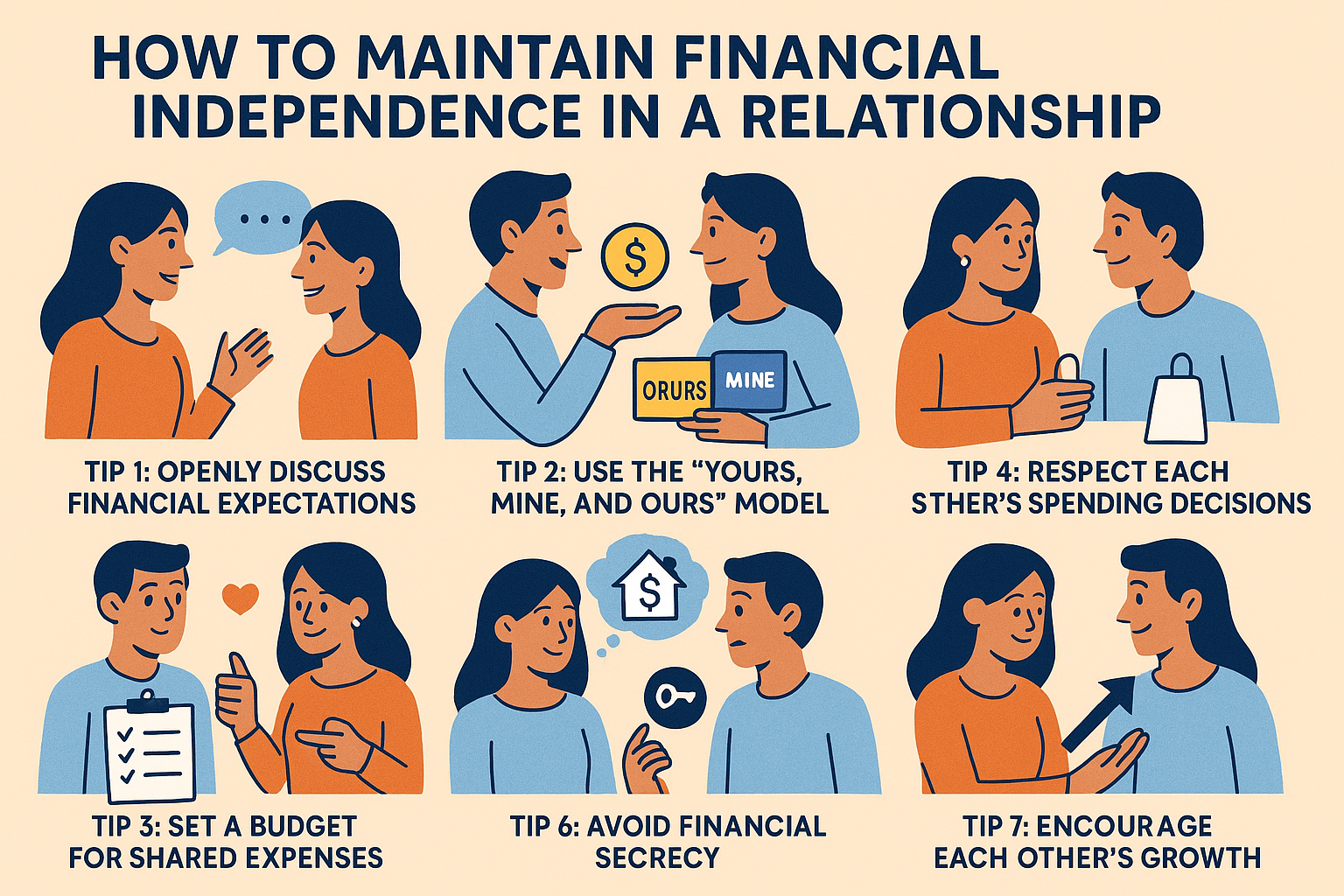Being in a committed relationship doesn’t mean losing your personal freedom — especially when it comes to finances. Many couples today are seeking a balance between financial unity and individual autonomy, and it’s not only possible — it’s healthy. When each partner has control over their own money while still contributing to shared goals, it builds trust, reduces resentment, and encourages responsibility.
So, how can you maintain financial independence while still thriving as a couple? In this article, we’ll explore practical tips and principles to help both partners feel empowered and aligned.
What Is Financial Independence in a Relationship?
Financial independence means that each partner:
- Has access to their own money
- Makes decisions about personal spending
- Can contribute fairly to shared expenses
- Doesn’t feel controlled or dependent
It’s about freedom of choice and financial self-confidence, even while sharing a life — and perhaps a home or family — with someone else.
Why Financial Independence Matters for Couples
There’s a common myth that love means merging everything, including money. But blindly combining all finances can lead to control issues, resentment, or imbalance, especially if:
- One person earns significantly more
- One partner has debt and the other doesn’t
- Spending habits and values differ
- There’s a desire to maintain privacy or autonomy
Allowing space for each person to manage their own money helps:
- Preserve individuality
- Encourage financial growth
- Prevent unnecessary conflicts
- Promote mutual respect
Tip 1: Openly Discuss Financial Expectations
Maintaining independence starts with clear communication. Have honest conversations about:
- How much of your finances you want to share
- What “independence” means to each of you
- Who covers which expenses
- Whether you’ll have joint accounts, individual accounts, or both
For example, you might agree to split rent and bills equally, while keeping separate accounts for personal use.
The most important thing? Agreement. Independence doesn’t mean secrecy — it means mutual understanding.
Tip 2: Use the “Yours, Mine, and Ours” Model
This system is ideal for couples who want to share responsibilities but still maintain personal control.
- Ours: A joint account for shared bills and goals
- Yours & Mine: Separate accounts for individual spending
You both contribute a set amount or percentage to the joint account, but the rest of your income remains yours to manage. This approach offers structure, fairness, and freedom.
Tip 3: Set a Budget for Shared Expenses
To avoid one partner feeling overwhelmed or taken advantage of, agree on a clear budget for joint responsibilities, such as:
- Rent or mortgage
- Utilities
- Groceries
- Travel or entertainment as a couple
- Childcare or pet expenses
Once that’s covered, you’re free to manage the rest of your income as you see fit.
You can also adjust the contribution method:
- 50/50 split
- Proportional to income
- Alternate bills monthly
Choose what feels fair and sustainable.
Tip 4: Respect Each Other’s Spending Decisions
With financial independence comes responsibility. That means:
- Not judging your partner’s personal purchases
- Not interfering with how they use their discretionary funds
- Trusting that they’ll manage their money wisely
You may not understand their love for buying gadgets, plants, or luxury coffee — but it’s their money. As long as shared responsibilities are met, personal choices shouldn’t be a source of conflict.
Tip 5: Keep Long-Term Goals in Sync
Independence doesn’t mean isolation. While day-to-day finances can be separate, big-picture goals should be shared:
- Buying a home
- Saving for retirement
- Building a college fund for children
- Starting a business
Have regular check-ins to align your long-term vision. Consider joint savings or investment accounts for these shared goals, while continuing to maintain your own financial path.
Tip 6: Avoid Financial Secrecy
There’s a difference between independence and secrecy. Hidden debt, secret credit cards, or unspoken financial issues can damage trust. Instead:
- Be transparent about your financial situation
- Talk about financial struggles or needs
- Share goals and setbacks honestly
If you’re hiding something out of fear or guilt, it’s time for a deeper conversation.
Tip 7: Encourage Each Other’s Growth
Support your partner’s financial independence by:
- Encouraging personal savings goals
- Cheering their career growth or side hustles
- Respecting their desire to manage their own money
- Learning together about investing, credit, or budgeting
The goal is to empower each other, not to control.
When Financial Independence May Be Challenged
There may be times when one partner can’t be fully financially independent, such as:
- During parental leave
- After a job loss
- While attending school or training
- Due to illness or caregiving responsibilities
In these moments, flexibility, compassion, and teamwork are key. Independence doesn’t mean refusing to help — it means mutual respect and shared support, especially during difficult times.
Final Insight: Autonomy Builds Stronger Partnerships
When each person in a relationship is financially secure, confident, and independent, the entire partnership becomes stronger. You aren’t relying on your partner to survive — you’re choosing to build something together, freely and equally.
A healthy relationship gives both partners the space to grow as individuals while building a meaningful life as a team. Financial independence isn’t about distance — it’s about respect, trust, and empowerment.
